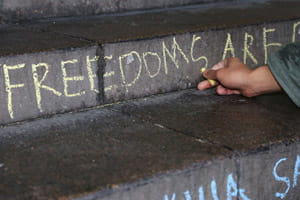To mark Human Rights Week and Human Rights Day this Thursday, Dr Andrew Fagan, Co-Director of Postgraduate Human Rights Studies at our Human Rights Centre, tells us about the vital role human rights play in the war on terror.
The terrorists, whose claim to religious legitimacy should not be recognised and hence who shall be referred to here as Daesh, have exerted a terrible toll on the lives of many in a short space of time since emerging from the chaos of the Middle East. It has not been the only atrocity carried out in their name, but the horrific murder of 130 people in Paris on Friday 13 November appears to mark a turning point in much of the international community’s resolve to destroy Daesh.
Given its location as the birth-place of the 1789 Declaration of the Rights of Man and of the Citizen, Paris is a symbolically significant target for those who seek to destroy the values upon which human rights are based. The Declaration marks one of the key endowments which the French Enlightenment bestowed upon humanity, undoubtedly exerting a considerable influence upon our modern human rights movement and all that it stands for.
Much of the world responded to the Paris terrorist attacks through symbolic acts of solidarity, exemplified by the raising of the French Tricolore and the singing of the French national anthem, the Marseillaise, at a succession of commemorative public events. In responding in such ways, millions of us demonstrated our capacity for solidarity with the suffering of our fellow human beings. Many of us were also expressing our longer-term commitment to protect the values and ideals which the terrorists aim to attack.
Daesh does not only kill ‘Westerners’. It also kills Muslims. We are all targets in Daesh’s hate-fuelled ideology. Fundamentally, it seeks to destroy all of those whose values and ideals call for the resolution of conflict via mutually respectful dialogue. These values and ideals are not geographically restricted to the ‘West’, but seek to provide protection for all human beings everywhere. We all share a fundamental interest in upholding such values and ideals.
The military campaign against Daesh is gaining momentum but success cannot be won by military force alone. Any long term success will require the reassertion of the kind of values and ideals which the terrorists aim to undermine.
The values of human rights are those of peace. Human rights do not require everyone to hold the same views and profess the same religion. Upholding human rights requires that we respect one another’s differences in a spirit of mutual respect. Daesh would like nothing more than to see the world continue to turn away from human rights and succumb instead to violence and hatred. In the longer term, terrorists have most to fear from peoples’ commitment to peace. Respect for human rights offers a means by which that commitment can be maintained and strengthened.
One of the strongest weapons we all possess in our moral armoury is our commitment to human rights. Today, of all days, we must ensure that all of those who hate the idea and the possibility of respect for human rights are reminded of just how powerful our resolve to uphold human rights is.


